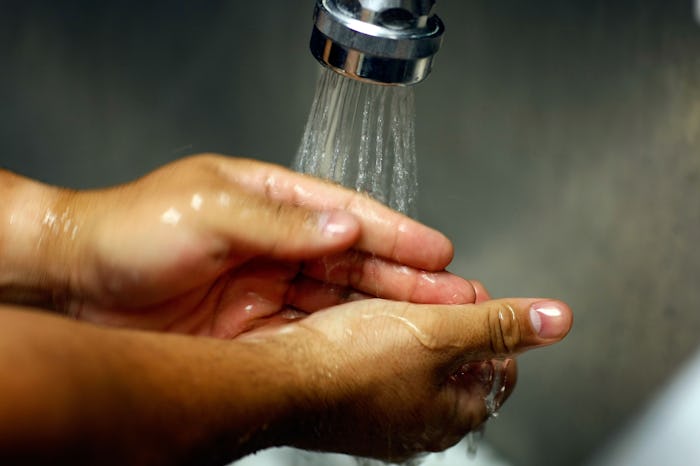Life

Why Hand Sanitizers Don't Kill Norovirus
Friends, if you’ve managed so far to avoid catching a particularly nasty strain of norovirus, I salute you. Sincerely. Norovirus — also known as winter vomiting virus or plain old stomach flu — tends to go around with a vengeance, and it turns out the one thing that most parents keep in their germ-fighting arsenal is of zero use when it comes to stopping the stomach flu. Why won’t most hand sanitizers kill norovirus? "The alcohol in hand sanitizer hasn’t been shown to work as well as hand washing with soap and water," Dr. Juan Leon, Ph.D., a global health associate professor at Emory University, tells Romper.
Here’s the thing about norovirus: It’s spread by coming in contact with fecal matter. That means it spreads in laundry, in food touched by poorly washed hands, and even in the air when a toilet is flushed. It also means that proper hand washing is the most effective means of staying healthy, according to the Centers for Disease Control. The problem is that most people don’t wash their hands well enough to kill norovirus.
It would seem that using a strong, alcohol-based hand sanitizer might offer an extra bit of insurance, right? Especially for those of us with little ones still learning how to properly scrub their hands. Not this time.
Traditional hand sanitizer doesn’t work on norovirus because of the bug’s unique structure, according to a study published by the American Society for Microbiology. Each particle is surrounded by a protein-based shell called a capsid. The capsid helps the virus stay alive on surfaces and avoid getting dried out. It also forms a protective layer that alcohol just can’t get through.
Hand sanitizer also doesn't work when hands are visibly dirty or greasy, according to the CDC. While traditional sanitizers work well on germs in sanitary environments like hospitals, they typically can't remove bigger messes. Since hand sanitizer can't fight off the norovirus bug or clean visibly dirty hands, which can unfortunately happen when the norovirus symptoms hit, it's virtually useless in this situation.
So, when cleaning after sick people in a school or home, it’s important to use cleansers strong enough to do more than just wipe the particles away. To kill norovirus — and avoid accidentally infecting others days or even weeks down the line — requires a stronger agent like bleach or hydrogen peroxide.
The CDC’s best advice for handwashing to avoid norovirus is simple: Use regular soap and hot water, but do it for at least 30 seconds, scrub hard, and be sure to get under those nails. Diligence is important because even a few particles of norovirus can lead to a full-blown case of vomiting.
Stay healthy, friends.
Expert:
Dr. Juan Leon, Ph.D., global health associate professor at Emory University
Studies referenced:
Liu, P., Yuen, Y., Hsiao, H.-M., Jaykus, L.-A., & Moe, C. (2009). Effectiveness of Liquid Soap and Hand Sanitizer against Norwalk Virus on Contaminated Hands. Applied and Environmental Microbiology, https://journals.asm.org/doi/10.1128/AEM.01729-09
Additional reporting by Eden Lichterman
This article was originally published on